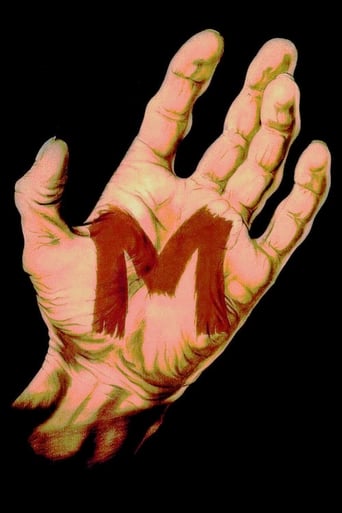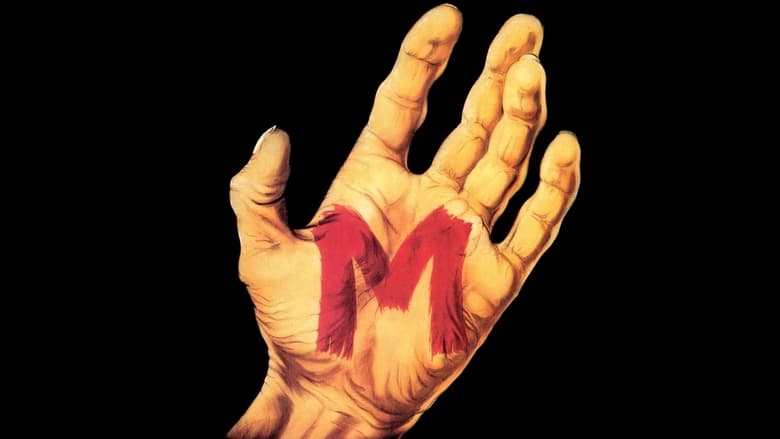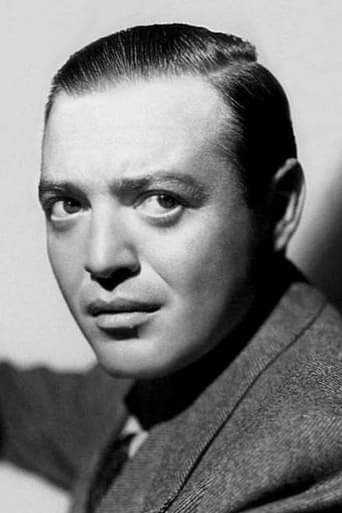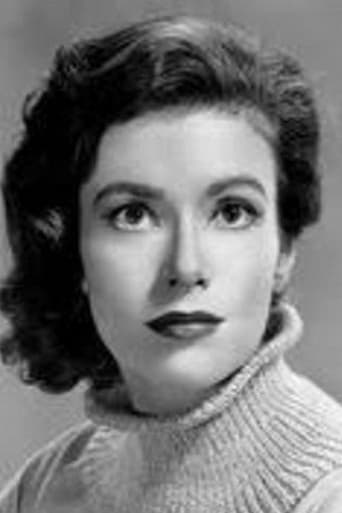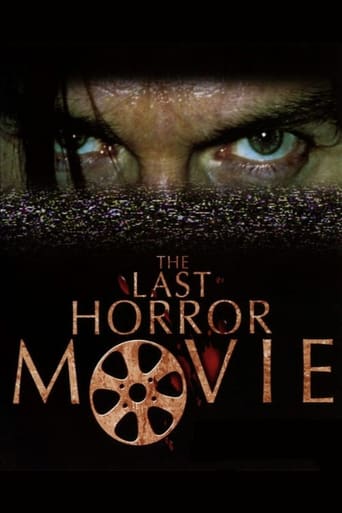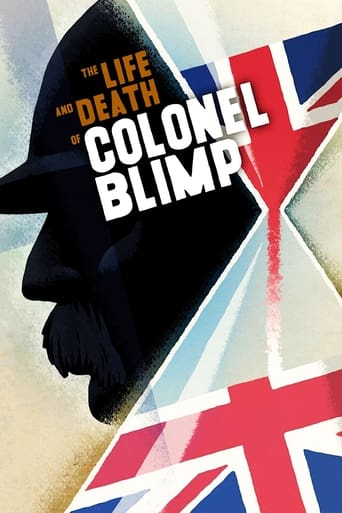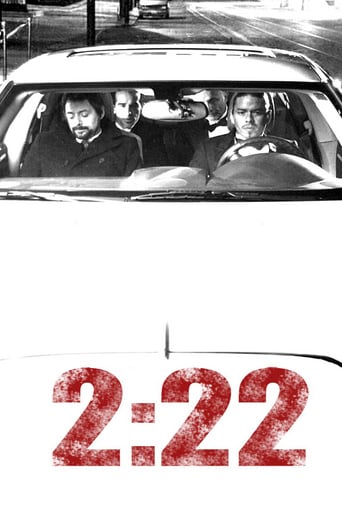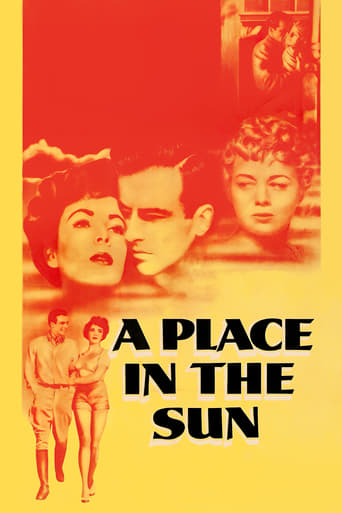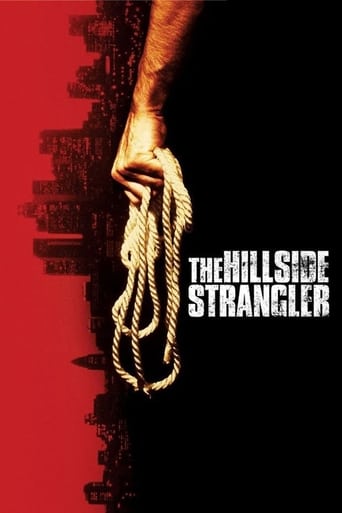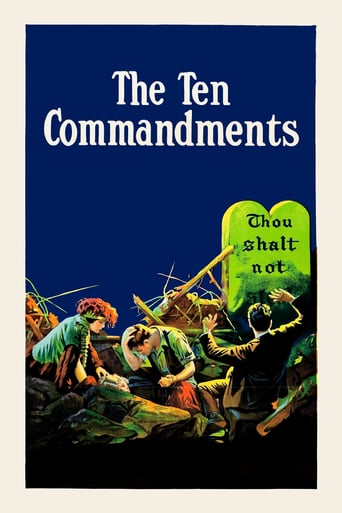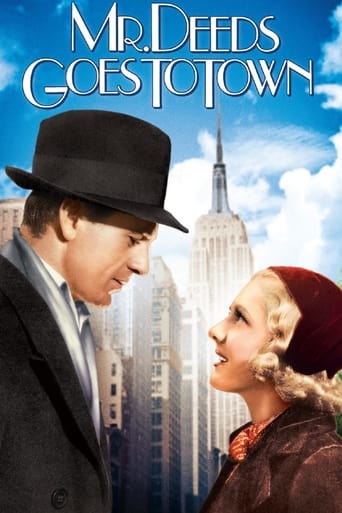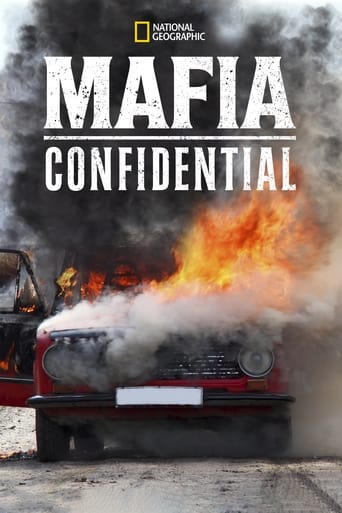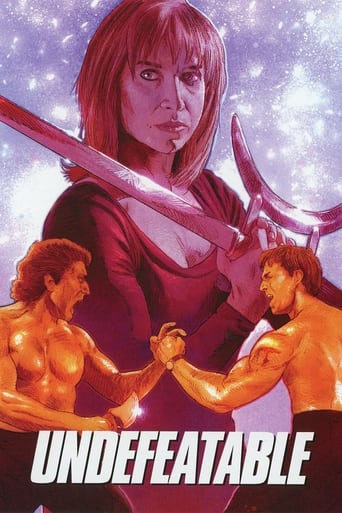M (1933)
In this classic German thriller, Hans Beckert, a serial killer who preys on children, becomes the focus of a massive Berlin police manhunt. Beckert's heinous crimes are so repellant and disruptive to city life that he is even targeted by others in the seedy underworld network. With both cops and criminals in pursuit, the murderer soon realizes that people are on his trail, sending him into a tense, panicked attempt to escape justice.
Watch Trailer
Cast


Similar titles
Reviews
the audience applauded
It is neither dumb nor smart enough to be fun, and spends way too much time with its boring human characters.
The acting is good, and the firecracker script has some excellent ideas.
It's the kind of movie you'll want to see a second time with someone who hasn't seen it yet, to remember what it was like to watch it for the first time.
M has to be one of the most influential movies ever made, both technically and psychologically. With an outstanding Peter Lorre, suspense that outsuspenses Hitchcock, excellent cinematography and a deep sociological layer added to it, M is one of the masterpieces of the psychological thriller genre.It is a film devoid of typical humanitarian propaganda, yet it is not the case that we immediately feel the need to relate to the child murderer Hans Beckert ( Peter Lorre ) since Fritz Lang also shows us the effects his gruesome crimes have in the form of the police constantly raiding establishments, the grieving parents & random people accusing eachother of the murders. It is not a movie that forces its opinion on you, but causes you to think about what is truly right and wrong. Hans later claims he cannot help himself because he has an irresistible compulsive urge to kill which cannot be stopped, much to the dismay of other career crooks who claim they only commit crimes to survive and take no pleasure or feel no compulsion towards it. It is a psychological kind of movie that is still as relevant as ever today as it was in 1931.Peter Lorre is ofcourse the perfect fit for the psychopathic child murderer, he has the perfect innocent wide eyed look for a psychopath, who seems to even be likeable when he is not murdering children. His signature whistle by Edvard Grieg - In the Hall of the Mountain King is a nice creepy addition to his character which he uses to lure kids to their doom. Ofcourse the incredible shot at the start which focuses on Hans's shadow on the poster that lists his crimes and reward for capture while talking to a little girl before killing her is a great ironic symbolism to announce his character.It was Lang's first sound picture, yet only two third of the movie was shot with actual sound while everything else was shot silent. This was primarily to keep the costs down since sound equipment was very expensive at the time. It creates a weird mix in constant transitioning from silent to sound. Yet as Lang has stated it adds another layer to the eeriness the movie has, so it only enhances the experience instead of unimmersing you out of the film. The cinematography is revolutionary in its use of low key lightning, which is a technique that was used many times after in the classic Film Noir era in Hollywood. The result is many Film Noirs share a visual resemblance with M due to their dark tone. Not only visually, but psychologically many themes of M have been repeated throughout the years in cinema. It was one of the first instances of a semi-sympathetic look on a pure psychopathic murderer, which has been repeated countless times in later years.Some might feel sorry for Beckert for having this affliction of which he cannot be helped while others would prefer to see him hang, the movie doesn't shove the right answer down our throats, and it's possible to look at it from either way without having a right answer. It is a sociological thinking man's picture that is as relevant now as it ever was.
Someone here on wrote "You'll remember this one forever" here on IMDB and I have to say that person is absolutely right. The fact that it is one of the first movies where they speak on camera makes it even more interesting and sometimes disturbing. The characters are fenomenal and the world that is pictured in this murder / crime / thriller is tremendous. The script is written with exact precision and I love the dark, almost depressing atmosphere that is within this movie.I was immediately sold when I saw and I will see this movie again soon. Just to compare how it has grown on me. Whenever someone ask me if I have "a favorite movie" I answer with this one. "M" and another movie called "Children of Paradise".Being a thriller with all the ingredients that a crimthriller needs. This is a must see. I could go on and on why you should see it.Fritz Lang, Peter Lorre and cat and mouse at its core.Just watch it!
Considering the fact that I regard director Fritz Lang's Metropolis as one of the crowning achievements in sci-fi cinema, I expected M to be an early hallmark of the thriller genre. However, while there's plenty to admire about Lang's first "talkie," it doesn't live up to the high standard set by Metropolis. The film follows two distinct groups, one composed of criminals and the other composed of police investigators, as they search for a serial killer of children after he strikes for the ninth time. What's most interesting about the film from a storytelling standpoint is that Lang eschews having a principal protagonist. Instead, Lang presents a three-prong narrative that focuses on Otto Wernicke's Inspector Karl Lohmann, Gustaf Gründgens' The Safecracker, and Peter Lorre's child killer Hans Beckert. Lang's decision to weave three story lines into one coherent narrative is a bold move, especially for a film nearly ninety years old, but Lang struggles just a tad to harness them all, leading to some slack pacing. The structure of the film felt akin to that of L.A. Confidential, but whereas that film functioned as a fascinating three- pronged character study, the characters in M unfortunately aren't as complex.However, it is refreshing to see Lorre receive plenty of screen time, considering his status as the film's antagonist. Most mystery films today spend their entire run time building up to the "big reveal," but Lang's decision to reveal the identity of the murderer halfway through allows for the film to benefit from Lorre's phenomenal acting. Carried mostly by a wide range of facial expressions, Lorre's performance elevates the film to a classic of German cinema. Despite his largely nonverbal performance, Lorre is also the beneficiary of one of the film's highlights: a powerful third act monologue in which Beckert reveals his motivations for the killings. The monologue itself proves magnificent, but I cannot help but feel that it's somewhat ill- conceived. I appreciate the fact that Lang devotes time to developing Beckert, crafting a more well-rounded character as a result, but I cannot sympathize with him. At his core, Beckert is still a child murderer, regardless of the contents of his speech. It almost feels like Lang uses the speech in an attempt to garner some last-minute sympathy for the character, but in that regard, he fails to hit the mark. Additionally, while the film's climax in and of itself is fantastic, the abrupt ending struck me as lazy and rushed. I can understand why Lang would want to leave Beckert's fate ambiguous, but another minute or two wouldn't have hurt.However, the film finds success in a multitude of other areas. For one, the camera work feels remarkably fluid, with Lang and his cinematographer Fritz Arno Wagner pulling off an array of technically impressive crane and tracking shots. Wagner's harsh lighting lends itself perfectly to the film's tense atmosphere as well. Apart from Lorre, the rest of the cast also delivers fine performances. Gründgens has a particularly solid turn as a career criminal driven to capture Beckert for his own sake while Wernicke makes the most of his cunning, unlikable detective. Lang also makes it clear that his career as a filmmaker began in the silent era, experimenting with the presence or absence of noise in certain scenes. The scenes bereft of noise are the most notable, with Lang selectively using them to amplify the tension. Initially, it feels jarring to see dozens of people milling around on screen without the presence of background noise or an orchestral soundtrack, but Lang's directorial skill prevent these scenes from feeling disconnected from the main narrative. Perhaps the main achievement here is that these overtly experimental scenes do not feel overly so.While I expected more from the director of one of sci-fi's most enduring cinematic masterpieces, I enjoyed most of what M had to offer. The cast, especially Lorre, delivers uniformly strong performances, while the film proves technically impressive in regards to its cinematography as well. And like any great thriller, there's also an underlying message that still resonates today, if even it is a bit too on the nose. However, while the film has certainly endured with age and still proves compelling from a mystery standpoint, it fails to reach the level of Metropolis because of Beckert's somewhat questionable characterization and storytelling flaws concerning the uneven pacing and overuse of exposition.Rating: 8/10 (Great)
Peter Lorre is absolutely unforgettable playing that most despicable of criminals, the murderer of children. The police of Berlin are having a very tough time identifying him as the culprit, but ultimately he is found out. Not by the police, but by the city's criminal underworld. They determine to mete out their own brand of vigilante justice. Not so much for altruistic motives, but because the increased police action is hurting their way of life.This early sound effort for both Germany and the highly regarded filmmaker Fritz Lang is a classic example of that form of cinema known as "Expressionism". It's stunningly shot and directed, counteracting its police procedural aspects with a matter of fact depiction of the machinations of this underworld. There's no music score, but then the script (by Thea von Harbou and director Lang, based on an article by Egon Jacobson) gets by just fine without one. Director Lang is still able to generate sufficient tension without that kind of assistance.A film of this kind wouldn't quite be to all tastes, as some people might feel that there is more talk (and the script *is* dialogue heavy) than action. But there is also plenty of wonderful black & white imagery on display, and a riveting climax where these gangland bosses give Lorre their own version of a trial.Although one shouldn't feel pity for such a beast - and Lang doesn't try to make the viewer feel that way - the killer is turned into a vivid, compelling character by Lorre. He desperately tries to make the case that he's not in control of his own actions, and is simply compelled to murder. He may not be pitiable, but he *is* pathetic.86 years later, the theme is still extremely relevant, and the fact that the story was at the time contemporary and not a traditional Gothic or anything like that gives it real immediacy. The setting may have been Depression era Germany, but much of the dialogue could easily be heard today.Nine out of 10.

